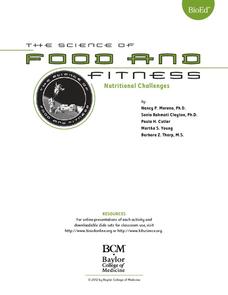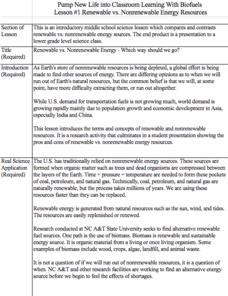MENSA Education & Research Foundation
Ecosystems
Explore the Earth's different ecosystems through four lessons, an assessment, and extension activities. Lessons include informative text and step-by-step instructions to apply knowledge in interactive, and thought provoking ways; such as...
Journey Through the Universe
Our Solar System
Take your class on a journey through our solar system. Learners explore each planet, from Mercury to Pluto, and discuss various features that differentiate one from another. They complete activities related to the topics and discuss the...
Maine Math & Science Alliance
Earth as a System
Ecosystem, human body system, weather system. We hear the word system a lot, but what does it really mean? In the activity, pairs or groups of learners discuss how a bicycle is a system and then analyze objects in their classroom and...
Consortium for Ocean Science Exploration and Engagement (COSEE)
Understanding the Food Web
Building on prior knowledge of the pervious lesson in the series, pupils explain the previous lesson to each other. Then they write a simple guide for a young child to read on the same topic.
Dearborn Public Schools
Parent Informational Meeting
What factors should parents and guardians consider when helping their children select high school courses each year? A presentation designed for Parent Information Night outlines the requirements students must meet in order to graduate.
Kenan Fellows
Density
Most scholars associate density with floating, but how do scientists determine the exact density of an unknown liquid? The third lesson in a seven-part series challenges scholars to find the mass and volume of two unknown liquids. Each...
Institute of Electrical and Electronics Engineers
Build Your Own Robot Arm
Engineers team up to design and construct an 18-inch-long robotic arm that can successfully pick up a paper cup. Each group is given the exact same set of materials, but it is up to them to decide what to use and how to use it. It is a...
Curated OER
Physical Challenge Activity Cards and Parent Letter
In this study of physical challenges and inventions worksheet, students take a letter home to their families explaining that they will be studying the affects of physical challenges and inventions that aid people who live with them. They...
Polar Trec
Family Polar Fun Day
Family fun days are great for connecting home and school life, building strong parent/teacher relationships, and engaging students in a fun and social way. Here are several activity ideas to help you and your class run your own Family...
ARKive
Marvellous Mini-beasts – Design a Species
Here is a creative activity that teaches kids how species evolve different characteristics for survival. The lesson begins as the class discusses and examines the adaptive traits of mini-beasts or insects. Then, in small groups, they...
BioEd Online
The Skeleton
Don't be chicken to try a lesson plan that compares the anatomy of birds to humans. Read the background information so you don't have to wing it when it comes to the anatomy of a chicken. Prepare cooked chicken bones by soaking them in a...
BioEd Online
Nutritional Challenges
Eating healthy can be a challenge, especially for people with special dietary needs. After learning about standard nutritional needs for adults, learners take on the role of a dietician and work together to create a menu for one of the...
Baylor College
Air and Breathing
Blow some bubbles and learn how living things need air in the eighth lesson of this series. Young scientists investigate this important gas by observing bubbles and monitoring their own breathing. A simple and fun activity that raises...
Curated OER
Insects A-Z!
Alphabet insects! Who has ever heard of such a thing? Get ready because your class is going to research insects that start with a specific letter of the alphabet. In small groups, they'll use the Internet and reference texts to locate...
ARKive
An Introduction to Endangered Species
Explore the world's endangered species with a presentation and bingo game activity. After viewing a presentation about the meaning of endangered species as it relates to specific animals, kids play a game of bingo with cards that...
NOAA
The Biogeochemical Cycle
The biogeochemical cycle ... no physics? The fourth installment of a 23-part NOAA Enrichment in Marine sciences and Oceanography (NEMO) program introduces the biogeochemical cycle by having pupils simulate movement between Earth's...
LABScI
Catapult: Flight of the Marshmallows
Watch your marshmallows fly. The engaging STEM activity has groups create a catapult to launch marshmallows. After testing their prototypes, they consider improvements and redesign their catapults.
Kenan Fellows
Renewable vs. Nonrenewable Energy Resources
Is one type of energy inherently good or bad? Young scientists explore energy resources in a week-long unit. After extensive research, groups create powerful position statements and presentations supporting their energy resource of choice.
SF Environment
Pre-School Composting and Recycling!
You can never be too young to get involved in composting or recycling. Here is a lesson that has been made for the very littlest learners and it's all about the importance of conservation. They'll sort compostable and recyclable objects,...
BioEd Online
Muscles and Bones: Nutrition
Got milk? Or almonds, sardines, or tofu? Calcium is important throughout life, but especially so for developing bodies. If teens do not consume enough calcium while they are growing, they are at a much higher risk of osteoporosis and...
Baylor College
Need or Want?
Even as adults it can be hard to distinguish needs from wants. Using pictures of common, everyday items, children make a pocket chart separating the objects they need from those that they want. Discuss their choices, explaining that...
Baylor College
Energy for Life (Energy from Food)
Energy comes in many forms, but how do living things get the energy they need to survive and thrive? In a simple, controlled experiment with yeast, water, and sugar, groups make observations about how yeast reacts with water alone, then...
University of Kentucky
The Great Spider Debate
Poor, misunderstood spiders! They are feared, disrespected, and detested by many people, yet they do so many positive things. A great addition to any insect unit, learn about some of the more common spiders, while hopefully dispelling...
Wild BC
Greenhouse Gas Guzzlers
Teams of six to eight players imagine that they are driving in a vehicle and collect balls that represent carbon dioxide emissions based on their different activities. "Greenhouse Gas Guzzler" cards tell teams how many balls to collect...

























